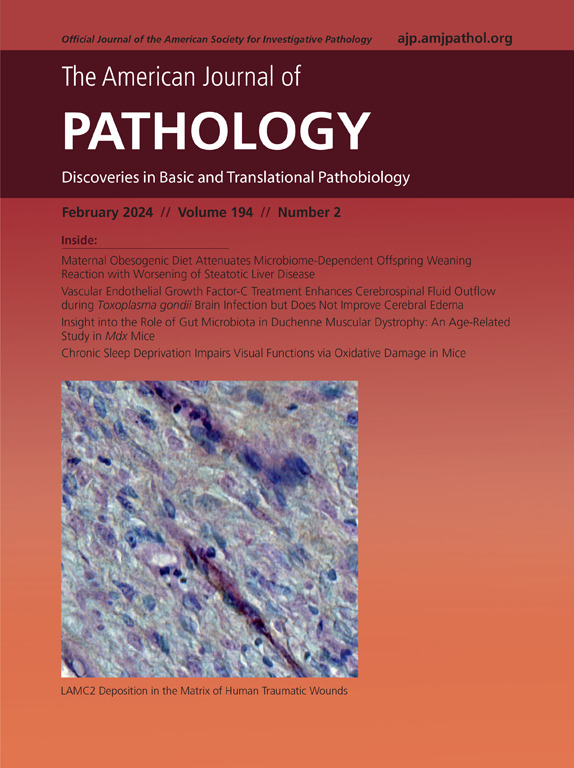Pleckstrin-2 在前列腺癌中介导 AKT 的激活,并受到雄激素受体的抑制。
IF 4.7
2区 医学
Q1 PATHOLOGY
引用次数: 0
摘要
PI3K-AKT和雄激素受体(AR)通路在前列腺癌中普遍被激活。它们之间的相互调控给晚期前列腺癌的治疗带来了困难。在这里,我们发现Pleckstrin-2 (PLEK2)是一种参与激活和稳定AKT的原癌基因蛋白,它连接着这两条通路。我们首先提供了遗传学证据,证明Plek2的缺乏在很大程度上逆转了Pten前列腺特异性基因敲除小鼠的肿瘤发生。PLEK2的过表达促进了前列腺癌细胞在体外的增殖和集落形成。此外,我们还发现PLEK2受AR的负调控。AR通过与PLEK2启动子区域结合转录抑制PLEK2。过量表达AR会降低PLEK2的表达,从而使AKT失活。相反,在前列腺癌细胞中敲除 AR 会增加 PLEK2 的表达并激活 AKT 通路。这种相互抑制的循环可通过 PLEK2 抑制剂进行药理学靶向治疗。我们的研究表明,PLEK2 抑制剂可通过使 AKT 失活,剂量依赖性地抑制前列腺癌细胞的增殖。总之,我们的研究揭示了 PLEK2 在前列腺癌增殖中的关键作用,并为靶向 PLEK2 治疗前列腺癌提供了理论依据。本文章由计算机程序翻译,如有差异,请以英文原文为准。
Pleckstrin-2 Mediates the Activation of AKT in Prostate Cancer and Is Repressed by Androgen Receptor
Phosphoinositide 3-kinase (PI3K)-AKT and androgen receptor (AR) pathways are commonly activated in prostate cancers. Their reciprocal regulation makes advanced prostate cancers difficult to treat. The current study shows that pleckstrin-2 (PLEK2), a proto-oncoprotein involved in the activation and stabilization of AKT, connects these two pathways. Genetic evidence provided herein suggests that Plek2 deficiency largely reverted tumorigenesis in Pten prostate-specific knockout mice and that overexpression of PLEK2 promoted the proliferation and colony formation of prostate cancer cells in vitro. In addition, PLEK2 was negatively regulated by AR, AR transcriptionally repressed PLEK2 through binding to the PLEK2 promoter region, and overexpression of AR reduced PLEK2 expression, which inactivated AKT. Conversely, knockdown of AR in prostate cancer cells increased PLEK2 expression and activated the AKT pathway. This reciprocal inhibitory loop can be pharmacologically targeted using the PLEK2 inhibitor. PLEK2 inhibitor dose-dependently inhibited prostate cancer cell proliferation with the inactivation of AKT. Overall, the current study uncovered a crucial role of PLEK2 in prostate cancer proliferation and provided the rationale for targeting PLEK2 to treat prostate cancers.
求助全文
通过发布文献求助,成功后即可免费获取论文全文。
去求助
来源期刊
CiteScore
11.40
自引率
0.00%
发文量
178
审稿时长
30 days
期刊介绍:
The American Journal of Pathology, official journal of the American Society for Investigative Pathology, published by Elsevier, Inc., seeks high-quality original research reports, reviews, and commentaries related to the molecular and cellular basis of disease. The editors will consider basic, translational, and clinical investigations that directly address mechanisms of pathogenesis or provide a foundation for future mechanistic inquiries. Examples of such foundational investigations include data mining, identification of biomarkers, molecular pathology, and discovery research. Foundational studies that incorporate deep learning and artificial intelligence are also welcome. High priority is given to studies of human disease and relevant experimental models using molecular, cellular, and organismal approaches.

 求助内容:
求助内容: 应助结果提醒方式:
应助结果提醒方式:


